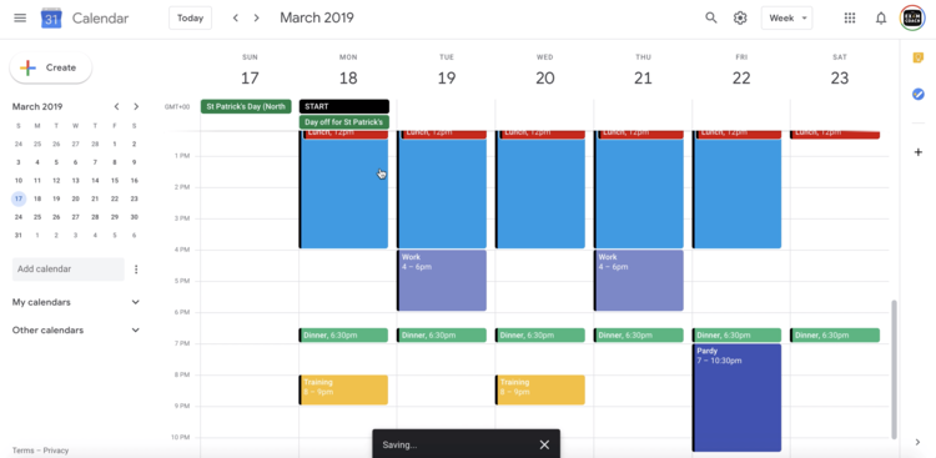Revision timetables
How do I make a revision timetable?
- Focus the majority of your effort on topics most likely to come up in the exam and carry the most marks.
- Measure progress based on topic coverage rather than time studied for.
- Adapt your timetable to accommodate for the rate at which you are able to understand and memorise information as time goes by.
Option 1: Go digital. Specifically, use Office Calendar
- A digital calendar is likely to always be with you.
- Flexibility. You can make adjustments neatly and cleanly. Rigid timetables which aren’t adjusted regularly cause stress.
Option 2: Download and use the blank templates.
Figure Out How Much Time You Have To Revise
Are you currently on school holidays and have a set period of time available time before you go back to school?
Is it term time but you want to get some revision done before and after school?
Is it exam season and you’re on study leave?
Do you have an exam timetable which you can use to pace your revision against for each subject?
Whatever category you find yourself in, set a clear deadline so you have something to work towards.
Give yourself just enough time to make your revision goals achievable.

Prioritise Your Subjects/Topics
You need to decide which subjects you currently feel the most and least confident about.
The best way to do this is to make a list. Write the subjects you’re weakest at towards the top and those where you’re strongest towards the bottom. Give each of them a number as a reminder for when you input them into your timetable. S
When you’re making this list take into account a couple of other factors such as:
- The amount of material to be learned within each subject.
- The order of your exam timetable (if you have it already). You’re going to have more time to revise some subjects than others based on where they are positioned within your exam timetable.
- What your grades currently look like – for example, if your Physics grade is rock bottom, you might want to prioritise it above the class you’ve already got 60% in through nailing the coursework (if applicable).
Break Subjects Into Topics and allocate 30 Minute Time Slots To Revise
Allocate 30 minute time slots to study each topic. Here’s the workflow you need to follow when scheduling your sessions:
-
Position topics you’re likely to find challenging when you know you tend to work best in the day.
-
Use colours to differentiate subjects from one another in your calendar and make sure you write the subject and topic you need to revise
-
Find a balance between topics you’re less familiar with and those which you think you’ll be able to get through quickly.
-
Leave a few time slots blank towards the end of the day for some rapid reviews and testing.
Why 30 minutes?
-
The reason for this time frame is it breaks the day up more so we have the chance to vary what we’re revising in each session. There are three benefits to this:
-
Revision becomes less monotonous and slightly more interesting.
-
Time distortion: smaller chunks of time add the helpful illusion that we’re doing more, this sense of progress can help build positive momentum.
-
Interleaved practice: cognitive psychologists believe that by varying what we study regularly stronger distinctions and memory associations will be formed between each set of information.
-
A time goal: it provides a time goal for each session so we are held more accountable to actually revising the topic when we’re at our desk, not day dreaming for some of the time and using the time we’ve studied for as the vanity metric for success which makes us think we know more than we do.
-
AN IMPORTANT NOTE ON MOMENTUM (NEVER GIVE IT UP)
Just because we’ve allocated 30 minute time slots does not mean you have to stop revising each topic at 30 minutes. In fact, one of the biggest rules about this revision timetable is to never give up your momentum. Don’t take a break just because your timetable said so. Keep working until you start to lose concentration and efficiency, then take a break. Especially when trying to understand difficult concepts freeing up larger extended blocks of time can be the key to unlocking a breakthrough moment.
If one of your 30 minute sessions runs over into the next, adjust things, figure out a new way to make it work in the time you have remaining. Do you now need to cover something you already had a decent understanding of faster than planned? Make decisions on the go.
Momentum and flexibility. Remember this.
What To Do Within Each Revision Session
This is crucial because it ensures you not only understand the information but can remember and recall it too.
Your initial revision sessions are going to involve you taking bullet pointed notes on what you need to learn on A4 sheets of paper and then condensing these bullet points on to flashcards which you can use to test yourself.
Use the memory retention strategies to help you with this.
Stay Flexible
It’s ok if you find things slow going to begin with or you can’t get into a good working rhythm. You will build some momentum eventually if you persist.
The key is to keep the discipline of revising when you said you were going to on your timetable and aim for a short burst of 30 minutes. Then push on if you’re feeling the momentum. If not, take a short break (5-10 minutes) and then hit the books again. Start with some easier information to get yourself going in each session if you need to.
As time goes by, make adjustments to your timetable to cover information you’re still not totally clear on.
